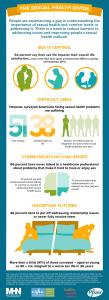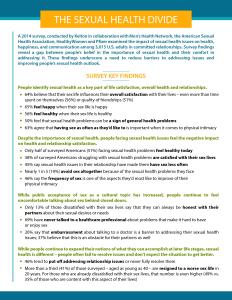New national survey finds people understand importance of sexual health but rarely talk about it #SexHealthChat Tweet
New National Survey Highlights Importance of Sexual Health but Reveals Lack of Comfort in Addressing Issues
Survey Suggests Need to Reduce Barriers in Addressing Sexual Health Conditions
The survey was conducted by Kelton in collaboration with Men’s Health Network, the American Sexual Health Association, HealthyWomen and Pfizer. It examined the impact of sexual health issues on overall health, happiness, and communication among 3,015 U.S. adults in committed relationships in which at least one partner was experiencing a sexual health issue. Key findings from the survey will be presented this week at the 20th Annual Fall Scientific Meeting of the Sexual Medicine Society of North America (November 20-23).
“People are increasingly taking charge of their health in other areas, but that level of comfort hasn’t translated into addressing sexual health issues,” said Eli Coleman, PhD, Director, Program in Human Sexuality, Professor and Chair in Sexual Health, Department of Family Medicine and Community Health, University of Minnesota. “We see growing comfort with sex as a cultural topic, but people still aren’t talking about their own sex lives, which has important implications for their overall health and happiness.”
Survey findings also revealed that while people continue to expand their notions of what can be accomplished later in life, their outlook on sexual health is discouraging. More than a third of those surveyed – aged as young as 40 – believe they are resigned to a worse sex life in 20 years, particularly those who are already dissatisfied with their sex lives. Nearly 1 in 5 avoid sex altogether because of sexual health issues.
“The significance of sexual health to one’s overall physical, emotional and psychological well-being, reflected in these findings, creates an urgency to address sexual health issues, as people would with other health concerns,” said Brandon Leonard, MA, Director, Strategic Initiatives, Men’s Health Network. “Embarrassment and discomfort are barriers, indicating a need to consider ways to encourage more of the large percentage of Americans who suffer from sexual health conditions to address them.”
Key survey findings include:
- 64 percent of participants believe that their sex life influences their overall satisfaction with their lives – more than time spent on themselves (56%) or quality of friendships (51%); 65 percent feel happy when their sex life is healthy
- Among surveyed Americans facing sexual health problems, only 38 percent are currently satisfied with their sex lives
- 69 percent have never talked to a healthcare professional about problems that make it hard to enjoy or have sex; 26 percent say that embarrassment when talking to a doctor is a barrier to addressing their sexual health issues
- Fewer than one in four couples (24%) facing sexual health issues feel that they’re always able to be honest with their partners about their sex lives
- 46 percent tend to put off addressing relationship issues or never fully resolve them
The survey also explored a number of factors related to frequency of sex and general sexual health satisfaction:
- Participants have sex an average of five times a month; men would prefer to have sex twice as often (ten times), while women would prefer eight times
- Based on survey responses, men and women have differing priorities for improving physical intimacy. For women, priorities are improving their ability to achieve an orgasm (28% vs. 19% of men), emotional bonding with their partners (32% vs. 20%), and general enjoyment of sex (34% vs. 22%). Men are more apt to focus on their physical ability to have sex (38% vs. 22% of women) and being able to experiment (28% vs. 12%)
- Further, there is a significant gap in the way men and women communicate about sexual health issues. Twice as many men than women in opposite-sex relationships (42% vs. 21%) say they are more likely than their partners to start conversations about their sex lives
Men’s Health Network, in collaboration with ASHA, HealthyWomen and Pfizer, will host a Twitter chat (#SexHealthChat) to discuss the data on Thursday, November 20, 2014 at 3:00 pm ET. For more information, the multimedia news release is available at https://prn.to/1yFU9iQ.
###
About The Survey
In partnership with Men’s Health Network, the American Sexual Health Association, HealthyWomen, and Pfizer, Kelton conducted this survey within the United States between July 16 and July 29, 2014, among 3,015 adults (aged 40-74) who are sexually active and in committed relationships where at least one partner is experiencing at least one sexual health issue, using an e-mail invitation and an online survey. This sample included 1,503 men and 1,512 women.
About Men’s Health Network
Men’s Health Network (MHN) is a national non-profit organization whose mission is to reach men, boys, and their families where they live, work, play, and pray with health awareness messages and tools, screening programs, educational materials, advocacy opportunities, and patient navigation. MHN is the promoter of Men’s Health Month and Men’s Health Week in June. Men can learn more about their health through MHN’s new online resource center, www.menshealthresourcecenter.com. Learn more about MHN at www.menshealthnetwork.org and follow us on Twitter @MensHlthNetwork and Facebook at www.facebook.com/menshealthnetwork.
About American Sexual Health Association
The American Sexual Health Association (ASHA) was founded in 1914, formed out of early 20th century social reform movements focused on fighting sexually transmitted infections (known then as venereal disease, or VD) and prostitution. Nearly 100 years after its creation, ASHA remains America’s nonprofit authority for sexual health information. ASHA specializes in communications outreach to the public, patients, press, providers, and policy makers by developing and delivering sensitive health information through many vehicles such as our websites, ashasexualhealth.org, iwannaknow.org (for teens and young adults), quierosaber.org (in Spanish), and nccc-online.org (site of the ASHA program, National Cervical Cancer Coalition).
About HealthyWomen
HealthyWomen (HW) is a leading nonprofit health information source for women. For nearly 25 years, women have been coming to HW for answers to their most pressing and personal health care questions. HW provides award-winning health information through a wide array of online content and print publications that are original, objective and reviewed and approved by medical experts. Its HON-certified website, www.HealthyWomen.org®, has been recognized by ForbesWoman as one of the “Top 100 Websites for Women” for the third year in a row and was named the top women’s health website by Dr. Mehmet Oz in O, The Oprah Magazine. To learn more, visit www.HealthyWomen.org.
About Pfizer Inc.
At Pfizer, we apply science and our global resources to bring therapies to people that extend and significantly improve their lives. We strive to set the standard for quality, safety and value in the discovery, development and manufacture of health care products. Our global portfolio includes medicines and vaccines as well as many of the world’s best-known consumer health care products. Every day, Pfizer colleagues work across developed and emerging markets to advance wellness, prevention, treatments and cures that challenge the most feared diseases of our time. Consistent with our responsibility as one of the world’s premier innovative biopharmaceutical companies, we collaborate with health care providers, governments and local communities to support and expand access to reliable, affordable health care around the world. For more than 150 years, Pfizer has worked to make a difference for all who rely on us. To learn more, please visit us at www.pfizer.com.
Contact:
Men’s Health Network:
Brandon Leonard
(202) 543-6461 ext. 101
[email protected]
Ana Fadich, MPH, CHES
(202) 543-6461 ext. 101
[email protected]
American Sexual Health Association:
Fred Wyand
(919) 361-3124
[email protected]
HealthyWomen:
Amy Takis
(917) 215-2232
[email protected]
Photo Gallery
Related Documents
InfographicFact sheet
ANR
Men's Health Network
www.menshealthnetwork.org.png)
Healthy Women
www.healthywomen.org.png)
American Sexual Health Association
www.ashasexualhealth.org.png)







